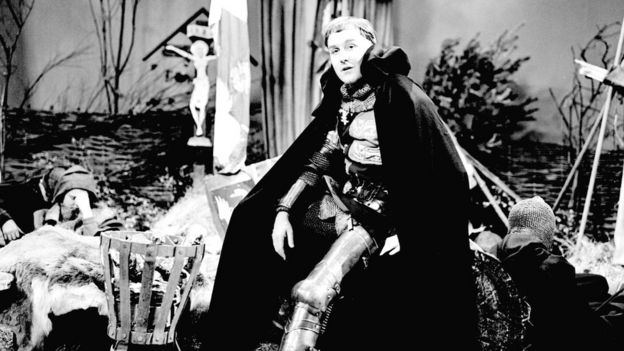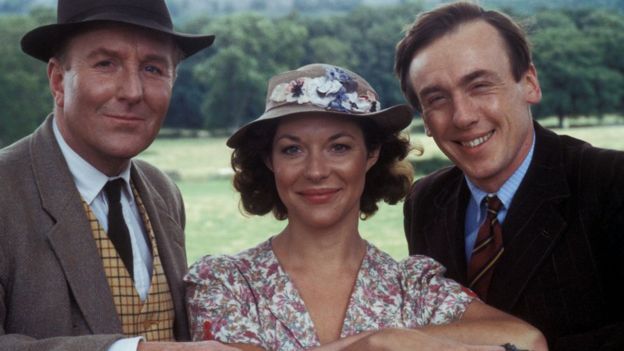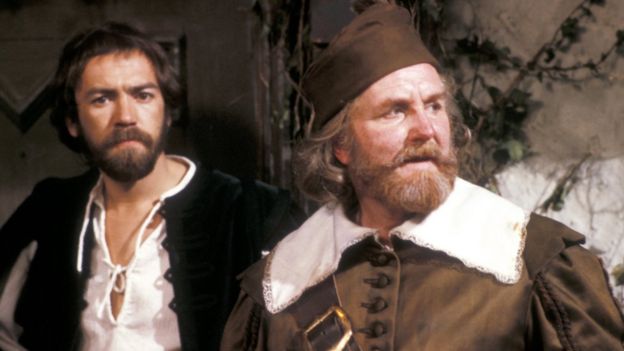With his instantly recognisable voice and British bulldog manner, Robert Hardy enjoyed a distinguished acting career which spanned eight decades.
By the time he endeared himself to television audiences in the BBC's All Creatures Great and Small, he had already carved out a reputation as one of Britain's most versatile actors.
While his earlier career gave him a firm grounding in the theatre his best known roles were in front of the camera - particularly in television, a medium he obviously enjoyed.
He became something of a specialist in the role of Sir Winston Churchill, playing the great man on half a dozen occasions as well as being in demand to reproduce the wartime leader's voice.
Troubleshooter
Timothy Sydney Robert Hardy was born in Cheltenham on 29 October 1925. The youngest of a large family, he was a self-professed "odd child".
His father was the headmaster of Cheltenham College and Hardy himself went to Rugby School before going up to Magdalen College, Oxford to read English.
It was while at Oxford that he struck up an enduring friendship with a fellow student, Richard Burton and both men found their studies interrupted when they were called up and posted to an RAF station in Norfolk.

Unlike Burton, Hardy returned to Oxford after his war service and gained a BA (Hons) in English as well as having enjoyed the opportunity to study under two of Oxford's most eminent names, JRR Tolkien and CS Lewis.
He had always been fascinated by Hollywood films and had determined to become an actor, joining the Shakespeare Memorial Theatre in 1949.
He was once asked what was needed to be successful in such a competitive profession.
"A certain amount of talent, luck, a spine of steel, a ruthlessness of mind that does not jib at murder and patience," he replied.
He was much in demand as a stage actor during the 1950s mainly playing Shakespearean roles, although he did make his first foray into cinema in 1958 playing a naval officer in the Glenn Ford film Torpedo Run.
He turned down Sir Peter Hall's offer of a contract with the Royal Shakespeare Company in 1960, complaining that it was for middle-of-the-roadish parts.
"I stormed at him one day and I behaved extremely badly," he said.
Volatile
He was reunited with his friend Richard Burton in the 1965 film, The Spy Who Came In From the Cold, where he played the role of Dick Carlton.
A year later he was given his first continuing role as the ruthless businessman Alex Stewart in the BBC production, The Troubleshooters, a drama based on a fictitious oil company called Mogul.
In 1978, Hardy took the part of the irascible but good-natured Siegfried Farnon in All Creatures Great and Small, the long-running BBC series based on James Herriot's best-selling books.
As the senior vet of the small Yorkshire Dales practice, Robert Hardy became one of the best-known faces on British television.

Full of animals, nostalgia and rural scenery, the show became a massive hit, attracting audiences of up to 20 million.
The original run ended in 1978 but the series was revived 10 years later after the BBC obtained permission to write new storylines, having exhausted the original James Herriot books.
But the new scripts failed to meet with Hardy's approval and he rewrote large parts of his dialogue. "All they did was make Siegfried explode and be bad-tempered. I kept changing things."
Hardy cornered the market in the role of blustering aristocrat, often dressed in tweed.
He appeared in The Far Pavilions, The Cleopatras, Bramwell and Middlemarch, and on the big screen in The Shooting Party and Sense and Sensibility.
He explained: "When you've lived a goodish span as I have, it's a case of roaming round the attic and borrowing a few characters."
Laird
Despite this range, Robert Hardy's own volatility and ability to express his wrath were channelled most successfully into his many portrayals of Britain's most revered premier.
He played Winston Churchill many times, even once in French on stage in Paris, but most memorably in the 1981 mini-series The Wilderness Years.
Hardy said himself of his complete immersion into the character, "My family complained loudly about my behaviour while I was playing him."

He was married twice and had three children. Awarded a CBE in 1981 for his services to acting, Hardy was also a keen student of military history and supported the project to raise the Mary Rose.
In 1995, he gave up his long-time home in Oxfordshire, to become laird of a Scottish mansion, a 13th Century miniature castle situated near Edinburgh, complete with a walled garden and 50-foot tower.
The actor had visited the place as a child and sworn always to return, following in the footsteps of a previous visitor, Sir Walter Scott, one of Hardy's personal heroes.
Longbow
In later years he suffered from cancer of the colon, but recovered to resume as busy a career as ever, including film work.
Although he failed to make the lasting impact on Hollywood enjoyed by some British actors, his face became known the world over when he appeared as the Minister of Magic, Cornelius Fudge, in several of the Harry Potter films.
He was dropped from the role after the studio balked at paying a £1 million life insurance premium which was demanded because of his advancing age.
Off screen he became something of an authority on the English longbow, his interest having been stimulated when, as a child, he found two of the weapons in the family attic .
He wrote two books on the history of the weapon as well as presenting a BBC documentary on the subject.
Hardy's on-screen temper was matched by a famously short fuse away from the camera and he admitted that, as an actor, he belonged to a set of "difficult people".
He once reflected: "The ego may be essential for survival in the wilderness of acting, but it's something that requires a great deal of control if you're going to make a success of life."
No comments:
Post a Comment